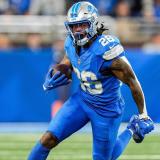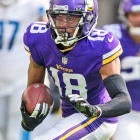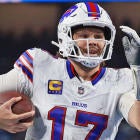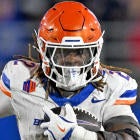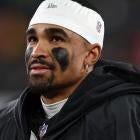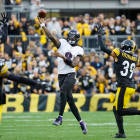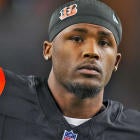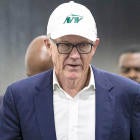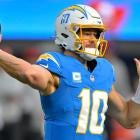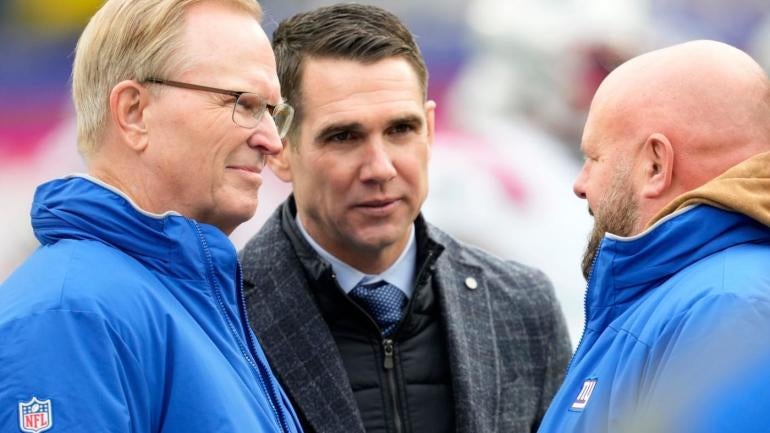
It's another dour Monday morning in East Rutherford, New Jersey, where the topic of interest among Jets fans isn't whether Aaron Rodgers can still lead Gang Green to the playoffs, but whether the team can easily dispose of Aaron Rodgers following the season. Not to be outdone, the Giants are doing their own number in the East Coast dance of quarterback malaise, pulling the plug on Daniel Jones after a 2-8 start.
It's neither an unreasonable nor a surprising move. Jones got basically six years to audition as the Giants' quarterback, and generally speaking, the less involved he was throwing the football, the better the Giants fared. Despite missing multiple games due to injury in four different seasons, the former first-round draft pick has the fifth-most turnovers (73) of any NFL player since 2019, his first year on the scene. It was time.
And yet, is now the time to applaud Giants brass for this decision? It's very possible, if not probable, that new starter Tommy DeVito, a fan favorite for his local ties and rookie-year athleticism, will give New York's offense a momentary boost. Both DeVito and fellow reserve Drew Lock conceivably offer more upside than Jones, as do a majority of signal-callers around the NFL.
But this begs additional questions: Why on Earth did it get to this point? Why did it take the Giants more than a half-decade to reach this conclusion? Why did it take the current regime almost three years? And, better yet, why is the offensive infrastructure not demonstrably better than it was when Jones first arrived, back when Pat Shurmur was still the head coach and Eli Manning was still in uniform? Jones may not have properly elevated the G-Men in 69 rocky starts, but how often did his staff and personnel elevate him?
Current head coach Brian Daboll would surely point to 2022, when Jones was taken under his wing, alongside a healthy Saquon Barkley and ultimately to new heights as the shepherd of a scrappy 9-6-1 playoff team that even upset the Minnesota Vikings on the road to open the postseason. Everything finally seemed to click at this juncture, except for the fact Jones almost exclusively operated as a ball-control figurehead for a run-first attack. There's nothing wrong with adapting in the name of victory. But the Giants either viewed this version of Jones as sustainable, or a stepping stone to elite strides as an actual passer. Because they soon made him, not Barkley, the face of the franchise with a $160 million long-term deal.
Again, on the surface, the Giants' decision-making wasn't illogical: Of course you pay the quarterback, not the running back, even if the latter boasts unteachably special traits, as Barkley did and still does, now with the rival Philadelphia Eagles. And Jones' bloated salary quickly dropped in the rank of lucrative quarterback deals. Still, it seems quite clear now, just a year and a half later, that New York fell victim to the market, overvaluing its own asset at the game's most important position, and caving to Jones' financial demands when he'd stacked one mildly promising season on top of three genuinely concerning ones.
That's only one piece of this multi-tiered failure by Schoen's administration, though. It was one thing to reward Jones for his leap from battered and unreliable to cautious and competent. It was one thing to believe in his potential for growth outside of the regime that drafted him No. 6 overall. It was another to expect Jones' already-questionable arm and decision-making to blossom, let alone meet $40 million per-year expectations, by pouring precious few resources into proven stars both up front and out wide. This year's lineup has produced at least two potential building blocks in Malik Nabers and Tyrone Tracy Jr., but only after Jones flailed around and blew out his knee behind a shoddy line to open 2023.
Daboll can in some ways be excused for building an offense so dependent on Jones' legs and short-area passing, because it seems he was often compensating for the quarterback's tools, or lack thereof. The Giants are still 17-26-1 under his watch, however, and that record doesn't happen by accident, or without a deeper dysfunction when it comes to situational play-calling, offensive strategy, and so forth. Just as with any team facing massive changes at quarterback (or higher up), many hands are to blame, and while Daboll specifically advocated for potential Jones replacements in the lead-up to the 2024 NFL Draft, he also held hands with Schoen as they pretended to reaffirm Jones as their future after the fact.
Speaking of Schoen and the ill-fated hunt for Jones replacements, this Week 11 switch to Tommy DeVito also reflects poorly on the men responsible for finalizing such a swap, because Jones' demotion was basically telegraphed for months. Schoen did not hide his interest in some of this year's top quarterback prospects, even while flaunting the magnitude of the contract he'd doled out to Jones during HBO's "Hard Knocks," which doubled as an excuse not to pay the departed Barkley as the Giants' offensive centerpiece. Everyone and their brother knew Jones was not long for the starting gig, unless he and Nabers somehow formed an instant Joe Burrow-Ja'Marr Chase connection at MetLife. The Giants trotted him out anyway, with nothing more than Drew Lock added as insurance and/or unofficial competition.
It's ironic -- or just fitting -- that Lock, guaranteed $5 million to become Jones' chief reserve, will now continue to ride the bench as the Jones era ends, likely for good. Meanwhile, Russell Wilson, who was available for the veteran minimum and reportedly rejected brief Giants overtures after New York informed him he wouldn't be competing for the top job, is guiding the Pittsburgh Steelers to a potential AFC North crown with a confidence approaching that of his peak Seattle Seahawks stardom. Then again, the Steelers aren't exactly flush with perennial questions regarding the stability of their staff.
In the end, the Giants may be better off with the unknown of a post-Jones offense. It's just a shame it had to take so much time, and so much trouble, to get here. Because the next steps -- at quarterback, on offense, across the board -- still belong to the guys who allowed it to get this bad in the first place.







